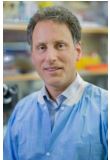Luminary Mark Prausnitz, PhD
Luminary Mark Prausnitz, PhD
Georgia Tech, School of Chemical & Biomolecular Engineering
Regents Professor, J. Erskine Love Jr. Chair in
Chemical & Biomolecular Engineering, and Director
of the Center for Drug Design, Development and Delivery
1. What sparked your interest in science in general and drug delivery in particular?
In high school, it became clear to me that science was my strength and applications were my interest, so I majored in chemical engineering. When finishing college, I delayed starting graduate school by a year so that I could work for a half year, save up money, and travel around the world for the rest of the year. The best job opportunity I found was at Alza Corporation where I worked in the “electrotransport” group, which was studying iontophoresis for transdermal drug delivery. I enjoyed drug delivery research, and have stuck with it now for almost 30 years.
2. Share a turning point or defining moment you experienced in your work as a scientist.
I feel that a significant turning point happened just this past year. We have been working to develop microneedle patch technology for many years through a variety of in vitro and animal studies. We recently had the opportunity to carry out a phase I clinical trial of influenza vaccination, which went very well. While I learned a lot and got a great deal of satisfaction from seeing our work studied in humans, I think that the clinical trial is an important milestone that moves the technology closer to using microneedle technology in medicine.
3. Tell us about the exciting ways in which your particular field is progressing.
The field of microneedles is moving from asking “if” something can be done to “how” it can be done. A number of companies have been formed to develop microneedle technology, and pharmaceutical companies small and large are exploring this technology for new products. The strong foundation established by preclinical studies appearing in close to 1000 journal articles is enabling clinical trials and manufacturing scale up. There are already cosmetic products based on microneedle patches (notably in Korea), and current phase 3 clinical trials of zolmatriptan delivery to treat migraines using microneedles patches (Zosano Pharma) and triamcinolone acetonide delivery to treat ocular inflammation using hollow microneedles (Clearside Biomedical) offer the promise of products for patients in the near future.
4. What is the best piece of professional advice you have received and from whom?
Bob Langer told me that good scientists are able to provide answers to scientific questions, but great scientists know which questions to ask. I think about that whenever I consider a new research project or design a new study. Doing research to answer a question can take years, so it is worth thinking critically about which questions are the best to work on.
5. Would you change anything about your career path if you could start over?
I think the best career path is one that is flexible and opportunistic. If I started over again, I am sure I would follow a different career path because different opportunities would come my way. I got interested in drug delivery because that’s where I happened to get a job. I got interested in using engineering technologies for drug delivery because I work at a university full of engineers. I got interested vaccines and global health because the Centers for Disease Control and Prevention and the Emory Vaccine Center at located just a few kilometers away. I think the best career path is guided by strategy and planning, but is also flexible enough to take advantage of opportunities.
6. What advice would you give to someone who is starting their scientific career?
Interesting science comes from combining two topics that have not been combined before. In my case, I look at technologies being developed by my engineering colleagues for industrial application and think about how they might be used for drug delivery. I would suggest that people think about interesting science happening outside the area of pharmaceuticals that might be useful for drug delivery? Even if you don’t know exactly what will come of it, I think that good things happen when you explore scientific interfaces that are new.
7. What do you enjoy doing outside of the lab? What are your hobbies/interests?
I like to spend time outdoors, especially walking and biking. I listen to the news and podcasts about current events, politics and stories. I like to the performing arts like theater, music and dance (especially when my children are performing!). I enjoy eating good food from different cultures. And I like to travel to interesting places around the world.

